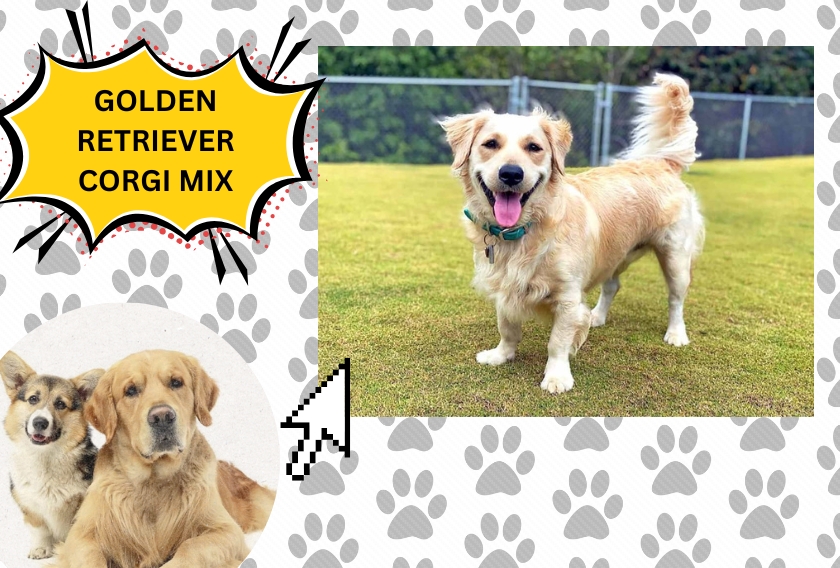The golden retriever is one of the most popular and adorable breeds. This breed originated in Scotland in the 19th century, bred for retrieving game during hunting. Known for their friendly and tolerant nature, they make ideal family pets and are highly adaptable, fitting well into both urban and rural environments. Golden Retrievers are known for their medium to large size, strong and athletic build, and beautiful golden coat, which gives the breed its name.

The “Yellow or Golden Retriever” was the breed’s official name in 1911. In 1920, the “Yellow or” was removed from their name, and they were formally referred to as the “Golden Retriever.”
Types Of Golden Retrievers: American, Canadian and British
Each type of Golden Retriever shares the breed’s hallmark traits of loyalty, intelligence, and a love for people, but their appearance and subtle temperament differences may influence which type is best suited to an individual’s lifestyle or preferences.
- American Golden Retriever: This variety has a leaner body with a sleek, golden to dark-golden coat and slightly shorter fur. They tend to be highly energetic and are often popular as family pets in the U.S.

- Canadian Golden Retriever: Typically taller and slimmer than their American counterparts, Canadian Goldens have a coat that ranges from light to dark gold with a thinner texture, giving them a distinct, graceful appearance.

- British (English) Golden Retriever: British Goldens are known for their stocky build, broader skull, and lighter cream-colored coats. They are often calm in temperament and are commonly seen in the UK and Europe.

| Characteristic | American Golden Retriever | Canadian Golden Retriever | British (English Cream) Golden Retriever |
|---|---|---|---|
| Build | Lean, athletic | Leaner and slightly taller | Stocky, broad build |
| Coat Color | Light to dark golden | Often darker than the American type | Cream to light golden |
| Coat Density | Dense, water-repellent | Lighter, less feathery | Thicker, often cream-colored |
| Head Shape | Balanced, medium-sized | Similar to American but leaner | Broader skull, shorter muzzle |
| Eye Shape | Oval, expressive | Similar to American | Rounder and darker |
| Temperament | Friendly, social, energetic | Friendly, active | Gentle, calm, affectionate |
Size Information and Life Expectancy of a Golden Retriever
Golden Retrievers are medium- to large dogs with a muscular, sturdy frame. They generally weigh between 25-34 kg (55-75 pounds) and stand about 21.5-24 inches tall. Their weight should be monitored to avoid obesity, which is common in this breed.
Male vs. Female Golden Retriever
Males are generally larger, weighing between 65-75 pounds and standing about 23-24 inches tall, while females typically weigh 55-65 pounds and stand 21.5-22.5 inches tall.
Male Golden Retrievers are often more affectionate and attention-seeking, while females may be more independent and focused.
Behavior and Temperament
Golden Retrievers are well-known for being kind, gregarious, and outgoing, which makes them perfect family pets. Their natural friendliness and tendency to get along with people, children, and other animals boost their adaptability in a range of homes. Golden Retrievers are often employed as therapy and service dogs due to their intelligence, exceptional trainability, and ability to comprehend and follow complicated instructions.

Their devotion is unrivaled; they develop tight relationships with their families and enjoy company, frequently desiring to be near their loved ones. They are also lively and cheerful, enjoying games, exercise, and outdoor activities. These qualities make them great companions for active people and families who love going on outdoor excursions.
They are extremely tolerant of children and are keen to accompany them.
How to Care for a Golden Retriever?
Golden Retrievers require moderate to high maintenance, including regular grooming, exercise, and a balanced diet to keep them healthy.
Housing Requirements
Golden Retrievers are adaptable but thrive in homes with a yard. Apartment living is possible if they are exercised frequently, but a house with space to roam is ideal.
Nutritional needs
Golden Retrievers should be fed high-quality, protein-rich dog food, specifically formulated for their age, size, and activity level. Feed them twice daily and avoid overfeeding to prevent obesity.

- Golden Retriever Puppies (2-12 months): Feed 1.5 to 3 cups of high-quality puppy food daily, split into 3-4 meals. Adjust portions as they grow to maintain a healthy weight.
- Golden Retriever Adults (1-7 years): Typically, adults need 2.5 to 4 cups of quality adult dog food daily, divided into 2 meals. Active or working Goldens may require more, while less active ones might need slightly less.
- Golden Retriever Seniors (8+ years): Older Goldens need 2 to 3 cups of senior or lower-calorie dog food daily, split into 2 meals. Senior food helps manage weight and supports joint health.
These amounts can vary depending on specific factors, including metabolism, activity level, and food type. Always check with your veterinarian to confirm the best feeding plan for your Golden Retriever.
Feeding table scraps to your golden retriever may lead to obesity as it has a high-fat content and is not formulated for dogs.
Exercise Needs
Golden Retrievers require daily exercise to stay healthy and happy. Aim for at least 1-2 hours of physical activity, including walks, runs, or fetch sessions.
Grooming Requirements
Golden Retrievers have a dense double coat that requires weekly brushing to minimize shedding and prevent matting. They may need more frequent grooming during shedding seasons as they shed heavily once or twice a year.

You can use a slicker brush on the dry coat for the detangling coat. Their nails should be trimmed regularly.
Training
Both genders are intelligent and trainable, but females may be slightly quicker to mature, which can make early training easier. To acquaint golden retrievers with new people, locations, and behaviors, their training sessions ought to begin early. Golden retrievers are smart enough to grasp instructions. Training by feeding them dog treats makes the task easier.

Related Breeds
Golden Retrievers are part of the sporting group and are related to breeds like Labrador Retrievers and FlatCoated Retrievers, sharing similar characteristics in size, temperament, and intelligence. However, mixed breeds of golden retrievers with other breeds are also very popular.
Health Concerns of a Golden Retriever
Golden Retrievers are prone to certain health issues, including:
Hip dysplasia: A genetic condition where the hip joint doesn’t fit properly, leading to pain and mobility issues.
Juvenile cataract: An eye condition affecting young Golden Retrievers, causing cloudiness in the lens and potential vision loss.
Elbow dysplasia: An abnormal elbow joint development, often resulting in arthritis and lameness.
Heart Disease: Golden Retrievers are prone to heart conditions like subvalvular aortic stenosis, which can affect blood flow and heart function.
Cancer: This breed has a higher risk of certain cancers, including lymphoma and hemangiosarcoma, which can be life-threatening.
Skin Allergies: Golden Retrievers commonly suffer from skin allergies, which can lead to itching, redness, and infections if not managed.
Regular vet checkups and preventive care are essential to catch early signs of these conditions.
Golden Retriever Pictures

Where to Buy
Golden Retrievers can be purchased from reputable breeders or adopted from rescue organizations. Always ensure the breeder provides health clearances for both parents to avoid hereditary health issues. The price of a golden retriever is around $2000-$3000. You can also join golden retriever forums and clubs to gain more insight about them.
Upkeep Cost
The average yearly cost of owning a Golden Retriever ranges from $1,500 to $2,500, covering food, grooming, health care, and other essentials.
Reproduction and Breeding
Although golden retrievers are sexually mature between the ages of 6 and 12 months, it is advisable to wait until the female is at least 2 years old before reproducing. Professionals should handle responsible breeding to guarantee the puppies’ health.

Pros and Cons of Keeping a Golden Retriever as a Pet
Pros:
- Friendly and social
- Great with children and other pets
- Highly trainable
- Ideal for active lifestyles
Cons:
- High shedding and grooming needs
- Prone to health issues
- Requires daily exercise
- It can be expensive to maintain
Interesting Facts About Golden Retriever
- Golden Retrievers are one of the most popular dog breeds in the U.S.
- They were originally bred to retrieve waterfowl for hunters.
- Golden Retrievers are excellent swimmers.
- Golden retrievers have a “soft mouth,” allowing them to carry objects gently.
- They’re often used as therapy, guides, and service dogs.
- Golden retrievers have a high tolerance for cold weather.
- They can learn more than 200 commands.
- Golden Retrievers usually have a lifespan of 10–12 years.
- They have a natural affinity for children.
- Their color can vary from light to dark golden shades.

Frequently Asked Questions
Question 1: Are Golden Retrievers good with kids?
Answer: Yes, they are friendly, patient, and excellent family dogs.
Question 2: Do Golden Retrievers shed a lot?
Answer: Yes, they shed year-round, especially during spring and fall.
Question 3: How long do Golden Retrievers live?
Answer: Their lifespan is typically 10-12 years.
Question 4: How much exercise do they need?
Answer: At least 1-2 hours of daily exercise is ideal.
Question 5: Can Golden Retrievers live in apartments?
Answer: Yes, but only if they receive sufficient exercise.
Question 6: Are Golden Retrievers easy to train?
Answer: Yes, they’re brilliant and eager to please.
Question 7: What is the best diet for them?
Answer: High-quality dog food with protein, healthy fats, and essential nutrients.
Question 8: Do they have any specific health issues?
Answer: They’re prone to hip dysplasia, cancer, and heart conditions.
Question 9: What grooming do they require?
Answer: Regular brushing, occasional baths, and nail trimming.
Question 10: Are Golden Retrievers good with other pets?
Answer: Yes, they’re generally friendly with other pets.
Conclusion
Golden Retrievers are one of the most popular dog breeds in the United States, known for their friendly personalities, intelligence, and gentle demeanor.


